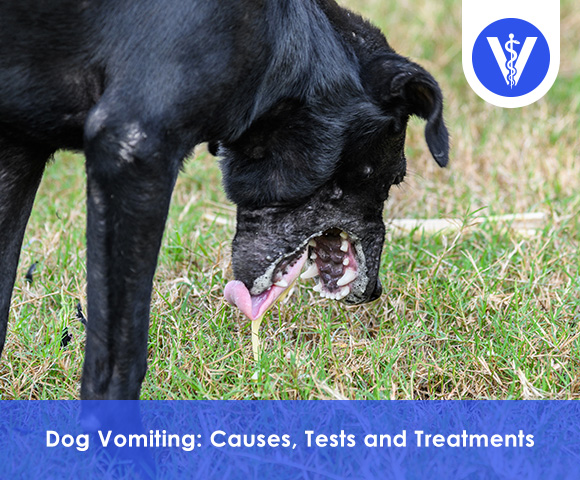Dog Vomiting: Causes, Tests and Treatments

Table of Contents
Dog vomiting is the forceful expulsion of the contents from the dog’s stomach and upper small intestine. Dog vomiting is caused by an upset stomach. Upset stomachs are caused by many conditions, from eating too fast to life-threatening diseases and symptoms such as cancer, viral diseases, metabolic and endocrine diseases, autoimmune diseases, and renal or organ failure. A dog throwing up is often caused by parasites, dietary changes, ingestion of toxins or poisons, and bacterial gastroenteritis from spoiled or poor-quality food.
Consult a veterinarian to answer, “Why is my dog throwing up?” Laboratory tests, such as hematology, rapid antibody testing, DNA testing, radiography, and histopathology, are done to diagnose the disease and find the reason for the dog’s puking. Treatment depends on the cause of the vomiting and includes medication to stop the vomiting, medication to induce further vomiting to rid the body of poison, or intravenous fluids if the dog is dehydrated. Getting vet treatment early produces the best outcome for a dog throwing up repeatedly.
What is Dog Vomiting?
Dog vomiting is the powerful expulsion of contents from a dog’s stomach and upper small intestine. A vomiting dog heaves the abdominal cavity and experiences nausea. Vomiting occurs when a dog eats too fast or consumes grass. Vomiting is a common side effect of diseases affecting body organs, such as cancer, endocrine disease, and chronic kidney disease. Prolonged vomiting causes dehydration, electrolyte imbalance, and metabolic acidosis. Dog vomiting must be corrected as soon as possible to prevent further damage.
What are the Causes of Dog Vomiting?
The causes of dog vomiting are listed below.
- Dietary imbalance: Dog gut health depends on quality food. Low-quality food increases the risk of gastroenteritis caused by bacteria and poor nutritional content. Human food causes indigestion in dogs because it is fatty, salty, and spicy. Dogs consuming plant-based foods daily develop a gut flora imbalance. Dogs have different gastric enzymes than humans and need moderate amounts of fruit and vegetables. Dogs vomit from gastric acid buildup in the stomach when fasting for extended periods.
- Infections: Infections from endoparasitic worms such as hookworms, roundworms, whipworms, and tapeworms cause dog vomiting. The parasites destroy the intestinal epithelium’s integrity and disrupt normal nutrient absorption. Parasitic protozoans like Giardia and Coccidia cause dog vomiting. Viral infections such as Canine Parvovirus and Canine Enteric Coronavirus cause viral gastroenteritis by destroying intestinal villi, leading to severe vomiting and diarrhea and subsequent dehydration and malnutrition.
- Toxins: Dogs that eat or lick small insects or animals, such as roaches, centipedes, beetles, toads, and lizards, ingest harmful toxins that cause vomiting.
- Poisons: Feeding dogs inappropriate food causes vomiting. Grapes, avocados, cherries, tomatoes, garlic, onions, mushrooms, chocolate, and rhubarb are poisonous human foods for dogs. Detergents, soaps, rat bait, and alcohol are poisons that cause dog vomiting.
- Underlying health issues: Vomiting is a symptom of underlying disease. Metabolic diseases such as diabetes, endocrine diseases such as Addison’s disease, renal failure from subsequent infections, cancer, foreign bodies, and autoimmune diseases cause dog vomiting. A disruption in any organ system leads to a disequilibrium in the dog’s body and causes vomiting.
Is Dog Vomiting a Sign of Underlying Disease?
Yes, dog vomiting is a sign of underlying disease. Vomiting has various causes, but it always indicates a problem. Change or damage to any of the organ systems results in vomiting. Physiological, anatomical, and psychological factors must be assessed to find out why a dog is throwing up.
Can Dog Vomiting Caused by Allergies?
Yes, dog vomiting can be caused by allergies. Dog allergies are triggered by certain proteins that cause inflammation within the gastrointestinal tract. The inflammation causes gastric upset in the form of vomiting and diarrhea. Dogs with a suspected food allergy start a diet trial of hydrolyzed or novel protein, such as venison, rabbit, and duck. The diet trials help assess if allergies in dogs cause vomiting.
Can Dog Vomiting be Caused by Depression?
No, vomiting cannot be caused by depression. Dog depression is the psychological effect experienced when the dog is feeling physically unwell or stressed. Depressed dogs behave the same way as chronically ill or stressed dogs. They have low energy, sleep more than usual, and do not enjoy everyday activities. Dogs that appear depressed and vomit frequently are a sign of an underlying issue.
Do Indigestible Plastic Materials Cause Dog Puking?
Yes, ingestible plastic materials cause dog puking. Stomach acids are not able to break down plastic. Ingesting plastic materials is able to cause an intestinal blockage that is a serious condition if not passed through the bowel. The condition is called a foreign body obstruction (FBO). FBOs cause persistent vomiting along with lethargy, inappetence, bloating, and constipation and require surgical intervention.
What should you do to your Dog After Vomiting?
After your dog vomits, you should clean up its mouth and note the vomit color, contents, and volume before removing it. Remember what the dog ate last when it vomited and what it did before the vomiting. Consult the veterinarian immediately if the dog has potentially consumed poison, toxin, or a foreign body.
Fast and observe the dog for 8-12 hours, checking its behavior for signs of pain and discomfort. Provide water in a bowl, but do not force the dog to drink. A home remedy to try when a dog is vomiting is to give them plain broth from a protein they usually eat. Ensure the dog consumes the broth slowly when ready. Another home remedy is some lukewarm water with a spoonful of honey. The honey serves as a natural source of glucose for extra energy while the dog recovers.
A dog exhibiting unusual behavior or vomiting within 12 hours after the initial vomiting episode requires veterinary treatment as soon as possible.
Should I give my dog water after vomiting?
Yes, give your dog water after vomiting. Place small amounts of easily accessible fresh water for the dog to drink. Do not force the dog to drink. Fast and observe the dog closely for 8-12 hours. Consult a veterinarian immediately if the vomiting continues.
How Does Dog Vomiting Cause Dog Headache?
Dog vomiting causes dog headache because vomiting causes excess water loss and dehydration. Dehydration in dogs results in contraction of the brain and other tissues. Brain contraction puts pressure on nerves, causing pain and dog headaches.
What are the Tests Done for Diagnosing Dog Vomiting?
The tests done for diagnosing dog vomiting are listed below.
- Physical exam: The veterinarian takes the dog’s health history, checks the vitals, and palpates the lymph nodes and the abdomen. The vet assesses the dog’s pain response in localized regions to establish what organs are likely involved.
- Hematology: Blood tests check for anemia, toxemia, sepsis, and poisoning. The vet draws blood and checks the complete blood count, liver and kidney function, glucose, lactase, and electrolytes. Shifts in homeostasis lead to vomiting and require immediate treatment. Treating vomiting due to toxemia and poisoning relies on blood tests to confirm the diagnosis, assess severity, and understand the prognosis. Viral diseases are diagnosed by performing DNA and antibody tests on the blood.
- Radiology: Radiography is used when the vet suspects foreign bodies, herniations, masses, or anything anatomically suspicious about the dog. Abdominal-focused assessment with sonography (AFAST) is often used when the dog vomits profusely or with acute onset.
- Fecal Exam: A common cause of vomiting is parasitism. Fecal worms are detected by fecal flotation or direct fecal smears. A small sample is taken from the rectum, prepared, and checked under a microscope. Microscopic eggs or protozoa are observed easily. Medication treats parasite infestation.
- Diet Trial: Dogs with suspected food allergies are treated with diet trials. Hydrolyzed diets and novel proteins such as kangaroo, duck, or rabbit are used to prevent common allergic triggers such as beef, pork, and chicken. The allergic cause is confirmed once the diet trial has been conducted and vomiting stops.
What is the Treatment for Dog Vomiting?
The treatment for dog vomiting depends on the causative agent. Antiemetic drugs such as Metoclopramide, Ondansetron, and Maropitant Citrate are used to stop vomiting. Dog vomiting caused by a toxin or poison ingestion is treated with medications such as Apomorphine and Xylazine to induce vomiting before the toxin and poison are absorbed.
Intense vomiting is managed with intravenous fluids to restore hydration and correct electrolyte imbalances. The veterinarian is able to establish the cause of the dog’s vomiting when the vomiting is under control. The vet will establish the cause of the vomiting and begin treatment of the underlying condition.
When to Visit the Vet Regarding My Dog Vomiting?
Visit the vet regarding your dog vomiting if the vomiting persists throughout the day. Vomiting is serious if the dog is lethargic and not behaving as usual. Dogs that have consumed toxins or poisons require immediate veterinary treatment. Do not treat dog vomiting caused by toxins or poisons at home under any circumstance.
Does Dog Need Admission Because of Vomiting?
Yes, a dog needs admission because of vomiting. Intense vomiting causes dehydration, electrolyte imbalance, and metabolic alkalosis, and treating it requires hospitalization with the vet. Regular monitoring and intravenous fluids are necessary for intense vomiting, and the vet has to determine what kind of fluid and electrolytes the dog needs. Dog vomiting caused by an infectious condition requires admission.
How to prevent Dogs from throwing up?
To prevent dogs from throwing up, follow the steps below.
1. Establish a consistent feeding schedule. Feed the dog with high-quality food suitable for its age. Puppy food and adult food have different caloric amounts and nutritional compositions. Avoid fasting a dog for more than 12 hours, especially for small dog breeds with fast metabolisms. Refrain from overfeeding the dog, and provide a consistent amount for each meal, typically 2-3 times daily. Overfeeding leads to obesity, pancreatic issues, and poor health.
2. Monitor a dog’s diet for potential allergens. Food is the typical cause if a dog vomits within minutes of eating. Take the dog to the vet for treatment. The vet diagnoses and formulates a plan to confirm the suspicion of allergies and administers the appropriate treatment.
3. Avoid abrupt changes in a dog’s diet. Abrupt changes in dog food “shock” a dog’s gut because it is not used to the new food. Shift the dog’s diet gradually by mixing portions of the meal with the old diet. Taper the dog off from the old diet by increasing the quantity of the new food in the mix. Vomiting is prevented because the gut has time to adjust to the new food.
4. Restrict access to harmful substances. Never leave the pet unattended, especially if they are extra curious. Ensure the dog is unable to eat or ingest scrap food or lick or eat bugs, plastic, or foreign objects. Keep household chemicals stored away, trash bins closed, and doors closed when leaving a dog to roam the house freely.
















